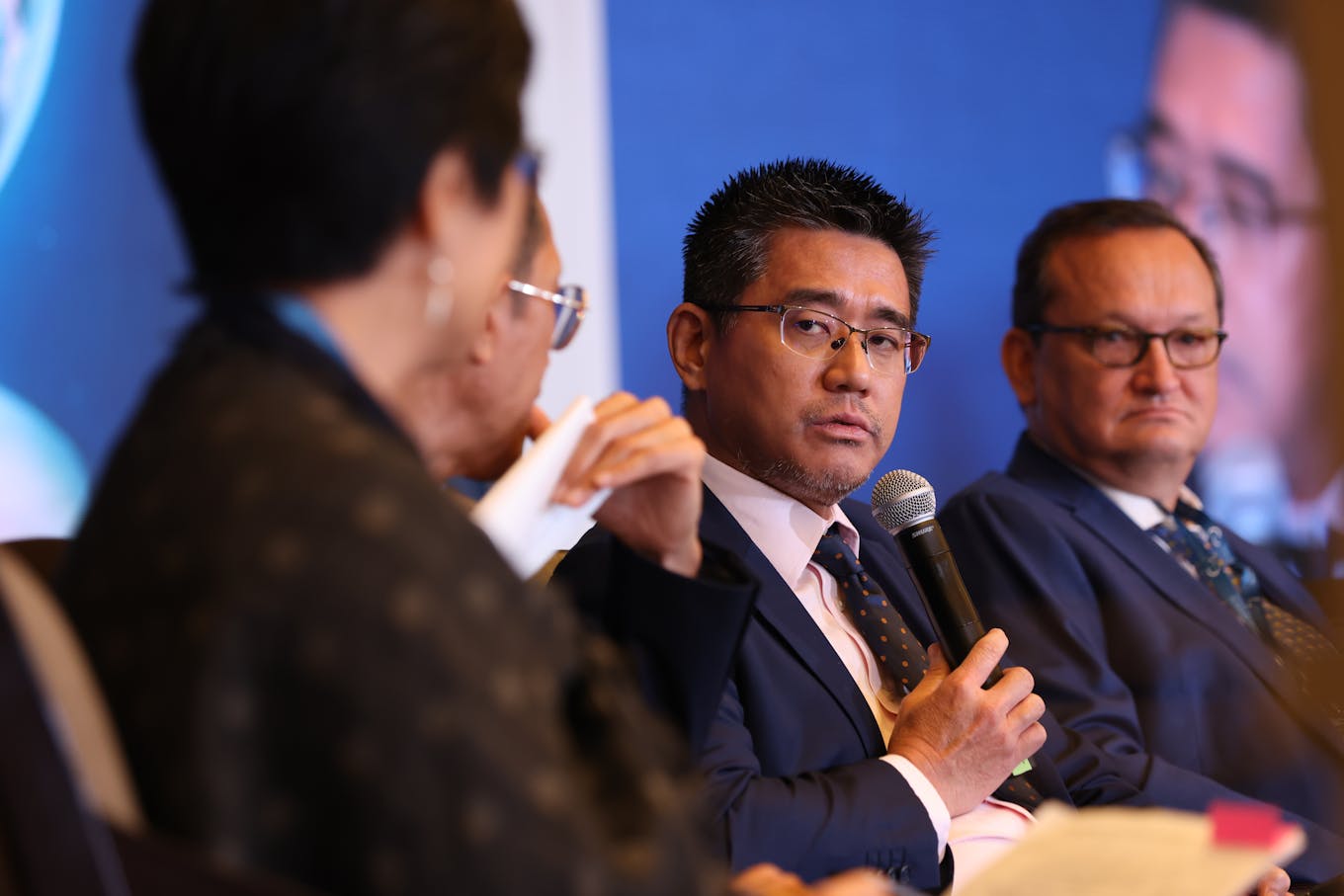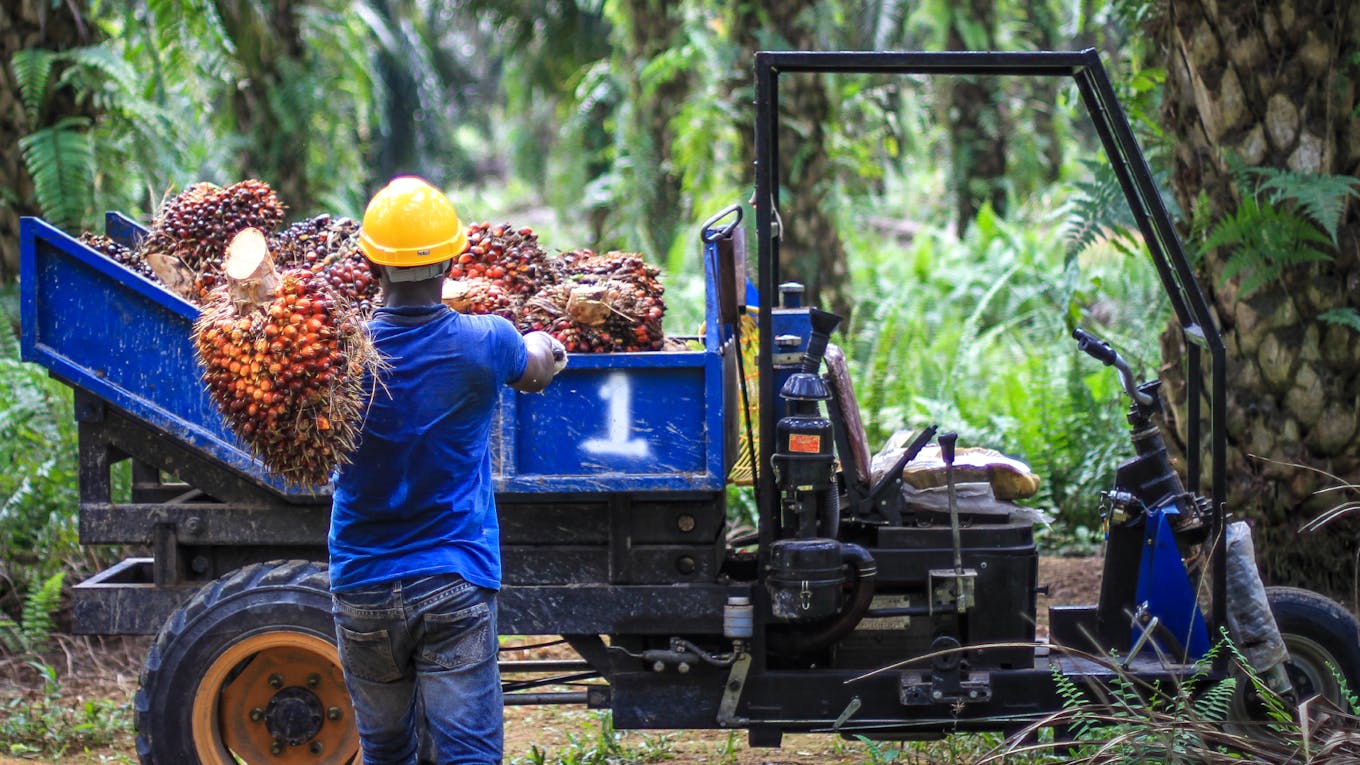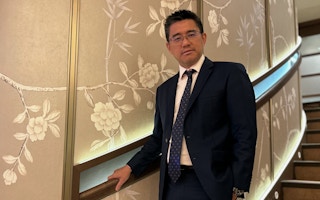The story of palm oil is changing – seemingly for the better – but there is more that needs to be done.
To continue reading, subscribe to Eco‑Business.
There's something for everyone. We offer a range of subscription plans.
- Access our stories and receive our Insights Weekly newsletter with the free EB Member plan.
- Unlock unlimited access to our content and archive with EB Circle.
- Publish your content with EB Premium.
At least that is what Ku Kok Peng, chief sustainability officer of Kuala Lumpur Kepong (KLK) Bhd, thinks. The Malaysian plantation conglomerate has been looking at how else it can improve its sustainability efforts, to take climate action beyond certification and compliance, since Ku stepped into the CSO role in March last year.
Speaking with Eco-Business when he was in Singapore recently to join a panel discussion organised by a local think tank, Ku revealed that the group will “very soon” announce new commitments, including clearer carbon reduction targets across its entire value chain, as well as revised traceability and human rights policies.
“We realised that having certification alone is not sufficient. Taking up the new role meant that I had to take KLK’s sustainability efforts to a higher strategic level, and there are a few areas in which we want to accelerate our work.”
Ku is particularly concerned about the “ill reputation” that the palm oil sector has acquired, which he believes is quite unfair. For example, statistics point to how the amount of deforestation caused by the industry has declined nearly every year in Indonesia, the world’s largest producer of the commodity. In Malaysia, there is a similarly positive trend, and Ku says the palm oil industry has mostly stopped deforestation, yet it still is blamed for its historically-bad legacy.
Ku, who had previously served at Pemandu Associates, a unit under the Malaysian Prime Minister’s Office, and was tasked to work on the country’s economic transformation programme, has used his influence and powers of persuasion – his background is in public relations, having worked for PR firms earlier in his career – to try to change this perception of the palm oil sector, with every opportunity he has, in his current role.
KLK, however, withdrew its membership from the High Carbon Stock Approach (HCSA) in April this year, joining other palm oil giants such as Golden Agri-Resources, IOI Group, Wilmar and Sime Darby Plantations. The wave of producers quitting the voluntary no-deforestation initiative has raised concerns among environmental groups that this points to a weakening of their sustainability pledges, but Ku defended the move, saying that it “by no means indicates that the group has, at any point, wavered on its high carbon stock commitments”.
The HCSA toolkit is already embedded within the Roundtable on Sustainable Palm Oil (RSPO) requirements, he said. RSPO is a certifier of sustainably-grown palm oil, of which KLK is a founding member. In a statement announcing its withdrawal, KLK said that it “strongly believes in doing what is right, beyond compliance with any regulatory requirements”, and will increase its focus on climate action, prioritising developing and acting on carbon reduction initiatives.
In this interview, Ku shares more detail on the pledges KLK has in the pipeline, his views on the European Union Deforestation Regulation (EUDR) and its impact on palm oil exporters, as well as what KLK is doing to counter the impending transboundary haze problem.
“
I think the intent of the EU Deforestation Regulation (EUDR) is good, but it will still have implications for us producers. The value chain for commodities is more complex than we think it is.
Ku Kok Peng, CSO, Kuala Lumpur Kepong (KLK) Bhd
It has been more than a year since you took up the CSO role at KLK. Can you tell us more about the areas of sustainability you have been looking at improving?
First, I want to say that KLK is a pioneer in the sustainability space. In 2004, we were the founding members of the Roundtable on Sustainable Palm Oil (RSPO) which promotes the growth and certification of sustainably-grown oil. Then in 2014, we adopted the No Deforestation, No Peat, No Exploitation (NDPE) policy, and in 2018, implemented the High Carbon Stock Approach (HCSA). So at least from a certification and compliance point of view, I was already enjoying the fruits of the foundations laid by my predecessors when I came into the role.
But in the last two to three years, there has been tremendous acceleration of the pace of development in sustainability. We realised that having certification alone is not sufficient. Taking up the new role meant that I had to take KLK’s sustainability efforts to a higher strategic level, and there are a few areas in which we want to accelerate our work.
The first is decarbonisation across the entire supply chain, which includes reducing emissions in upstream operations by looking at the feasibility of new technology, for example biomethane capture, as well as in our efineries in the midstream, and focusing on the downstream – or what is mainly Scope 1 and Scope 2 emission reductions. We want to explore the use of alternative green fuels or green electricity, which will help decrease Scope 2 emissions. These focus areas will give us a good foundation to then deal with our Scope 3 or supply chain emissions.
Human rights is another area we want to improve. I think we have a good track record in terms of managing our migrant guest workers with respect and dignity, but incidents [which involve migrant labour] that have surfaced in the past few years have shown that there is still the possibility that forced labour can be present in our supply chain. We have thus done a very thorough assessment and will be tabling some recommendations to our management on what we want to act on.

Ku (centre) speaking at the Singapore Dialogue on Sustainable World Resources last month on what the commodities sector can do for Asia’s net-zero transition. Image: Singapore Institute of International Affairs
Traceability is one of the more challenging issues we have to deal with. In the plantation sector, before the agricultural commodity gets to a dealer, it would have gone through multiple hands. To do traceability well, you will have to go through the supply chain layers. The European Union Deforestation Regulation (EUDR) that has come into force, and will take another 18 months to come into full effect, makes the situation even more complex. A small portion of a consignment might be what it takes to result in the entire consignment becoming non-EU law compliant. Now we don’t quite know what the exact due diligence mechanism looks like under the new regulation, as the EU has not spelt that out.
Some of the other large palm oil producers and exporters have come out openly to say they will not have difficulty complying with the new law as they have not been planting on deforested land for years, despite leaders of exporting countries – mainly Malaysia and Indonesia – calling the law discriminatory. What are the difficulties that KLK foresees it will face with compliance?
I think the intent of the EUDR is good, but what I mean to say is that it will still have implications for us as producers. The value chain for commodities is more complex than we think it is. Take a consignment for Rotterdam as an example. It could have potentially come from any of the 1600 mills that we have around Southeast Asia, and to have real traceability and demonstrate that there is no deforestation in a specific location, you will have to involve the dealers, the smallholders and planters.
That is very difficult and complicated for us, though over the next 18 months, we will try to identify the different types of platforms and technologies that we can use [to improve the traceability] of our products. We are also engaging with our suppliers, making them aware of the new regulation landscape, and persuading them to come onboard. When the mechanism does kick in, we will be able to further figure out if we already comply, and if not, we will have to work on closing the gaps.
You have described the palm oil industry as ‘unfairly maligned’, and have tried to set the context for this statement in many of your public speeches. Why this insistence?
The perception has been that palm oil is a major culprit for deforestation, but that is not necessarily true now. The situation in the sector has changed for the better. In Malaysia, planted hectares have shrunk. In Indonesia, there is significant reduction in the pace of expansion of palm oil plantations, to a point that we will be unable to fulfill the demand for edible oils and fats across the world in years to come. Within the sector, greenfield development has basically gone flat. We won’t be able to deforest further. Compared to other commodities, palm oil has the lowest land and carbon footprint, but delivers the highest yield – we are punching above our weight, yet we are suffering from a bad reputation.
At a crop-specific level, some research has also shown that the energy inputs required for palm oil are less than half of those required for other commodities such as sunflower, soybean and maize. That being said, there is still room for improvement. More methane capture can be done, although a significant number of mills are located in remote locations, which are quite a distance away from the main grid. Recently, another Malaysian company, Johor Plantations has commenced commercial operations of its first biomethane plant, linked to a natural gas distribution network. If the opportunities are unlocked, this could be a potential source of clean energy for Asean countries.
[Note: There are reports which reject the ‘productivity argument’ commonly raised by palm oil councils and associations, saying that there are problems with using yield productivity as a proxy for sustainability or climate impact.]
What else is KLK doing to clean up palm oil’s image?
We will very soon be disclosing our commitments. We will be committing to clear carbon reduction targets and will make them public. The work has actually been completed. We are now just setting in motion the communications plan, and you will hear from us very soon.
There are also other areas we are improving on, such as inclusivity, which includes working with smallholders to help them improve their yield, get certification and improve on product traceability. We are also diversifying our supplies and engaging with communities such as the Indigenous peoples, women farmers and the disabled.

Ku believes that palm oil, which is cultivated on only a minute portion of global agricultural land, but deliver high yields, has suffered from a bad reputation. Image: KLK Bhd
We have begun the process of our product carbon footprint and life cycle assessments, as this is what will be required by our customers in the future. We are also looking at regenerative agriculture, and engaging with other key stakeholders in the ecosystem to understand whether the model that we practise is what everyone else accepts as a good model.
On biodiversity conservation, other than maintaining our own high carbon stock and high conservation value areas, we are looking beyond our own landscape. For example, we are very passionate about supporting the protection of the Malayan Tiger, and are working with non-governmental organisations to first put boots on the ground and help take out poachers’ traps, which is a key threat to the Malayan Tigers up north in Malaysia.
Lastly, we are working on improving disclosure. We have got to put out information fully, so that whatever it is we are doing is fully appreciated by our external stakeholders, and they are in a better position to decide if we are a partner that they would want to continue working with, or to help finance.
KLK had been in the news for fires on its estate that contributed to the haze problem in the region. El Niño might be upon us soon [and a red alert has been sounded for transboundary haze to occur again]. What is KLK doing to prevent a repeat scenario?
We take fire risk very seriously. In our operations, especially in areas where we have planted on peat about one or two generations ago, we are putting emphasis on the management of water levels. There are local regulations, including fire risk prevention measures, that we have to comply with, and we have put up fire towers and retention ponds. We also have a very comprehensive fire brigade system.
We have even gone to the extent of communicating to the local communities that should there be any fire outside the one-kilometre radius outside our own landscape, we will help them put out those fires, because you can’t let a peat fire start. It will be very difficult to control.
We are putting in all the measures, and we hope nothing unfortunate will happen during this El Niño season. We are very committed to ensuring this.
This interview has been edited for clarity and brevity.












